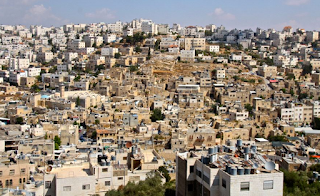
The question of Jewish property and assets turned over to Arabs in the West Bank after the 1948 Jordanian occupation is a thorny one. The Israeli government has decided to leave this particular can of worms unopened. In this paper, Russell A Shalev concludes that Israel should not fear the repercussions of restituting former Jewish property to its rightful owners. (With thanks: Colin)
A view of Hebron
This paper explored the status of the former Jewish properties in Judea and Samaria that were seized by Jordan in 1948. The Israeli Supreme Court in Valero ruled that the transfer of the property to Jordanian custodianship eliminated any ties between the previous Jewish owner s and the property. Contrary to the Supreme Court’s ruling in2011, this paper concluded that Israel legally can, and should, return the property to its former owners,without regards to a comprehensive peace agreement settling all claims between Israel, the Palestinians and the Arab states.This conclusion relies on the following justifications:
•Recognizing confiscated Jewish assets as Jordanian state property would be a violation of the principle of ex injuria jus non oritur, unjust acts cannot create law. The Jordanian seizure was illegal,was the result of Jordanian aggression and unrecognized annexation of the territory, and thus should be seen as invalid.
Jordan cannot enjoy rights to property gained through its illegal invasion in 1948.
The Status of Former Jewish Assets in Judea and Samaria are sui generis, ie.a unique historical and legal phenomenon, and they do not depend on a parallel comprehensive solution to the Palestinian refugee problem.The Palestinians have repeatedly rejected an internationally-accepted solution for the refugee crisis–resettlement in host countries. Instead, they have insisted on the”right of return.” The repatriation of thousands of Palestinian Arabs would cause massive disruption and chaos in Israel, upending public order and seriously threatening societal cohesion. By contrast, the return of a small amount of Jewish property owners in Judea and Samaria could hardly be considered a threat to public order, especially considering that Israelis are able to purchase land and build homes over the Green Line.
•Conditioning their return on parallel Arab claims would erase the distinction between aggressor and victim. Both the Jewish and Arab refugee crises stem from Arab aggression in Israel in 1948.
•Israel’s experience in Jerusalem shows that such parallelism is unnecessary and that the return of Jewish properties will not open the gates to a flood of Arab claims.
•Israel has a unique historical obligation to restore the seized Jewish properties. Just as the State of Israel sees itself responsible for the reclamation of Jewish property seized during the Holocaust in Europe and property confiscated from Jews in Arab countries, Israel is responsible as well for Jewish property in the Land of Israel.
To conclude, the Jordanian state bears responsibilty for the damage resulting from its aggressive actions. While Israel cannot press Jordan for full restitution for the damages incurred, Israel is able to restitute property owners in Judea and Samaria who had their assets seized.

Leave a Reply